Integrating Gender in Risk Communication and Community Engagement Programs: A Three-Pronged Approach
Across global health initiatives, gender integration has emerged as a pivotal aspect of effective program design and implementation. Guinea, in pursuing Global Health Security (GHS) priorities and the One Health approach, has embarked on a transformative journey towards inclusivity and equity within its risk communication and community engagement (RCCE) activities. Through proactive measures and innovative training, Breakthrough ACTION has spearheaded efforts to integrate gender into many RCCE projects to help Guinea move toward more inclusive and effective prevention and response interventions. To ensure these efforts’ sustainability and effectiveness, the project applied a three-pronged approach that includes (1) addressing misunderstandings, (2) empowering through education, and (3) fostering commitment and collaboration. Participants in Breakthrough ACTION’s activities have testified to how this approach helps them implement gender equity into their work.
Addressing Misunderstandings
Misunderstandings of gender and its relevance in health programs and RCCE activities are pervasive. Often, stakeholders and implementers equate gender solely with women, overlooking its broader implications. Additionally, GHS and One Health actors are primarily men, which can challenge gender integration and inclusivity in RCCE program design, implementation, and monitoring. Breakthrough ACTION Guinea recognized this obstacle and took proactive steps to dispel misconceptions while addressing the diverse needs of all individuals, regardless of gender identity, thereby fostering more inclusive and effective health interventions. By developing and implementing a comprehensive training curriculum, project staff aimed to broaden participants’ understanding of gender and its integral role in health programming. Interactive sessions and practical exercises offered clarity on gender concepts, challenging traditional stereotypes and norms that hinder effective interventions.
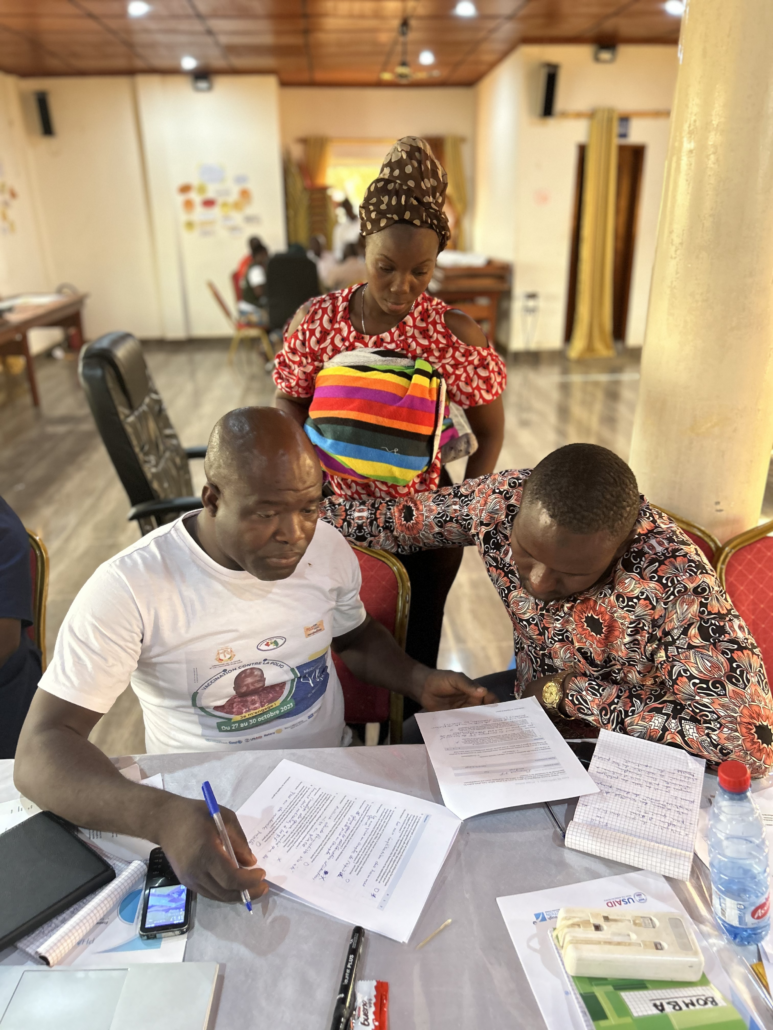
During small group work, participants from Nzérékoré use the Gender Check-in Tool to evaluate the level of gender integration in their existing and ongoing risk communication and community engagement activities. Photo credit: Antonia Morzenti
Empowering Through Education
Through a dynamic blend of formats—including PowerPoint presentations, animated discussions, case studies, and group work—Breakthrough ACTION Guinea’s curriculum equipped participants with practical tools and methods for gender integration throughout the program lifecycle. By delving into approaches to analyze gender disparities and adapt programs to diverse sociodemographic backgrounds, participants gained insights into fostering inclusivity at every stage of project development. Moreover, an emphasis on identifying gender inequities and strategically involving men and boys in RCCE activities signifies a holistic approach towards sustainable transformation of harmful and restrictive gender norms, fostering a healthier and more gender-equitable society.
Fostering Commitment and Collaboration
In addition to insightful testimonials from participants that underscore the training’s profound impact on the participants’ understanding and approach towards gender integration, another noteworthy aspect was the collaborative atmosphere that fostered creating actionable plans for immediate implementation. Throughout the training sessions, participants worked closely with peers engaged in similar activities, pooling insights and experiences to develop concrete action plans to enhance gender integration in their projects. For example, Adoma Konate Communication and Health Promotion Focal Point and Benjamin Évelyne Denise from the Ministry of Health and Public Hygiene expressed their dedication to applying the knowledge they gained into their daily endeavors, utilizing tools like the Gender Integration Continuum and the Gender Equality Check-in Tool to guide their efforts. This not only reflects individual commitment but also highlights collaboration and continuous improvement in gender integration initiatives.
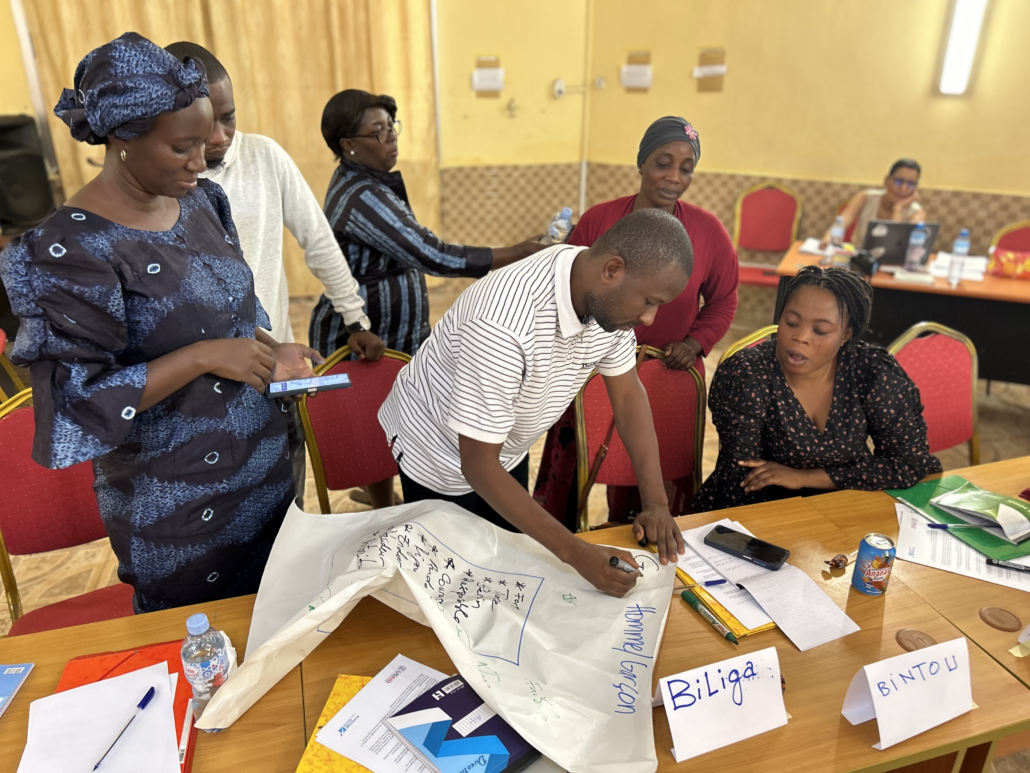
Participants from Kindia discuss what it means to be a “man” or a “woman” in their community, how one can step outside of that norm, and what the rewards and consequences might be. Photo credit: Antonia Morzenti
Looking Ahead
Through stakeholder commitment and collaboration across sectors, Guinea is poised to create more inclusive health programs that address the diverse needs of their communities. Breakthrough ACTION will follow up with participants to assess the training’s impact on their work to support and encourage transformative change in program design, implementation, and evaluation. By employing its three-pronged approach, Breakthrough ACTION Guinea has laid a solid foundation for creating impactful interventions that respond to diverse needs. As Guinea continues to advance its public health agenda, its gender integration efforts will pave the way towards a healthier, more equitable, and resilient society.
Finally, the training curriculum—currently in French—will be translated into English and for use by other Breakthrough ACTION countries of implementation, further amplifying its reach and impact on global gender integration efforts.
Written by: Antonia Morzenti, Senior Program Officer for Breakthrough ACTION Guinea and Francophone Lead for the Gender Equality and Social Inclusion Team

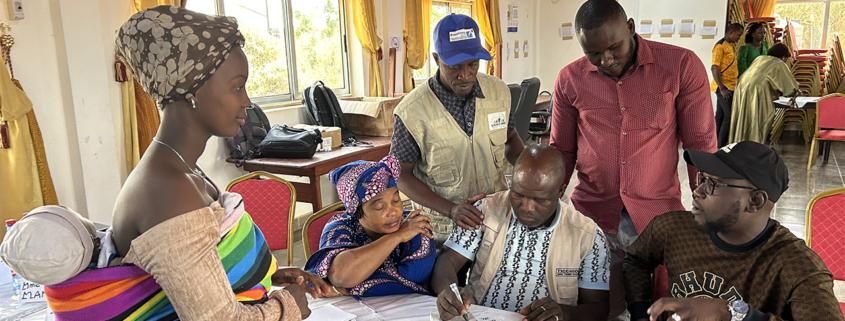 Antonia Morzenti
Antonia Morzenti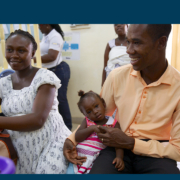 Sarah Hoibak/VectorWorks/Photoshare
Sarah Hoibak/VectorWorks/Photoshare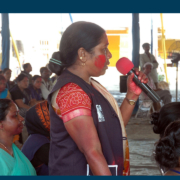 Gopal Bhattacharjee/Photoshare
Gopal Bhattacharjee/Photoshare Poravute/Getty Images
Poravute/Getty Images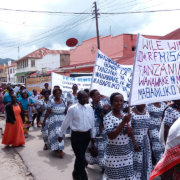 Rebekah Munnikhuysen/US Peace Corps/Photoshare
Rebekah Munnikhuysen/US Peace Corps/Photoshare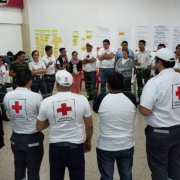 Sean Maloney/Breakthough ACTION
Sean Maloney/Breakthough ACTION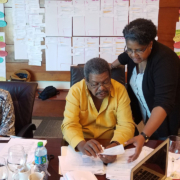 Anne Ballard Sara/Breakthrough ACTION
Anne Ballard Sara/Breakthrough ACTION